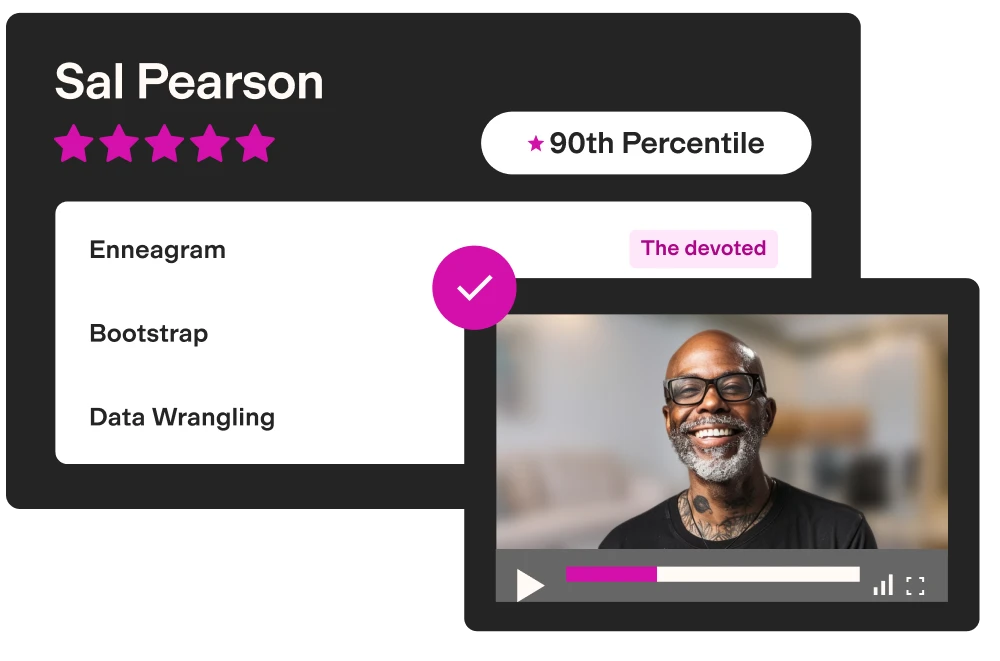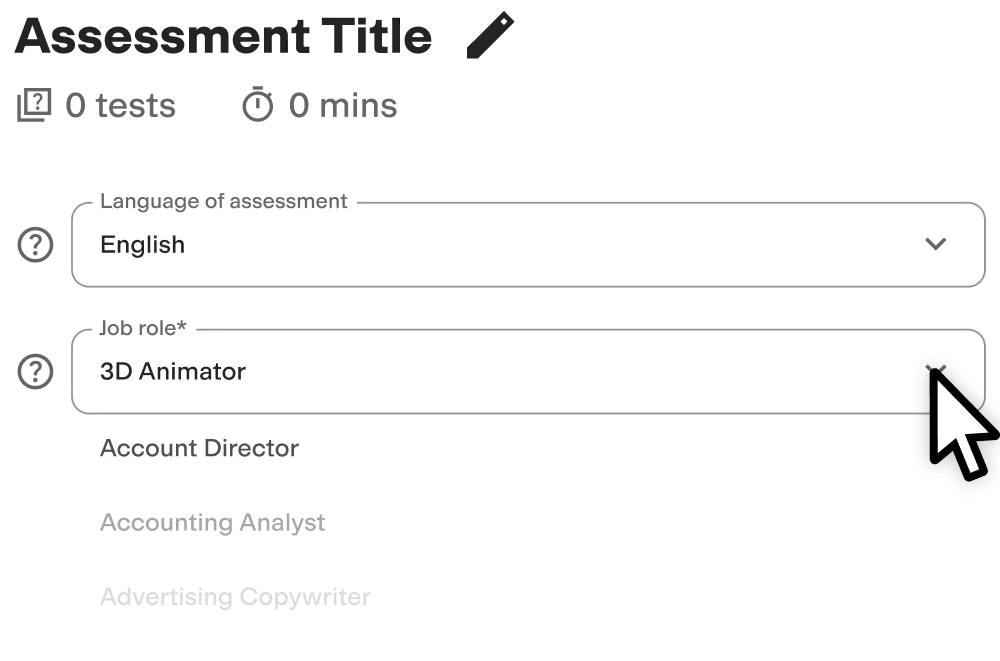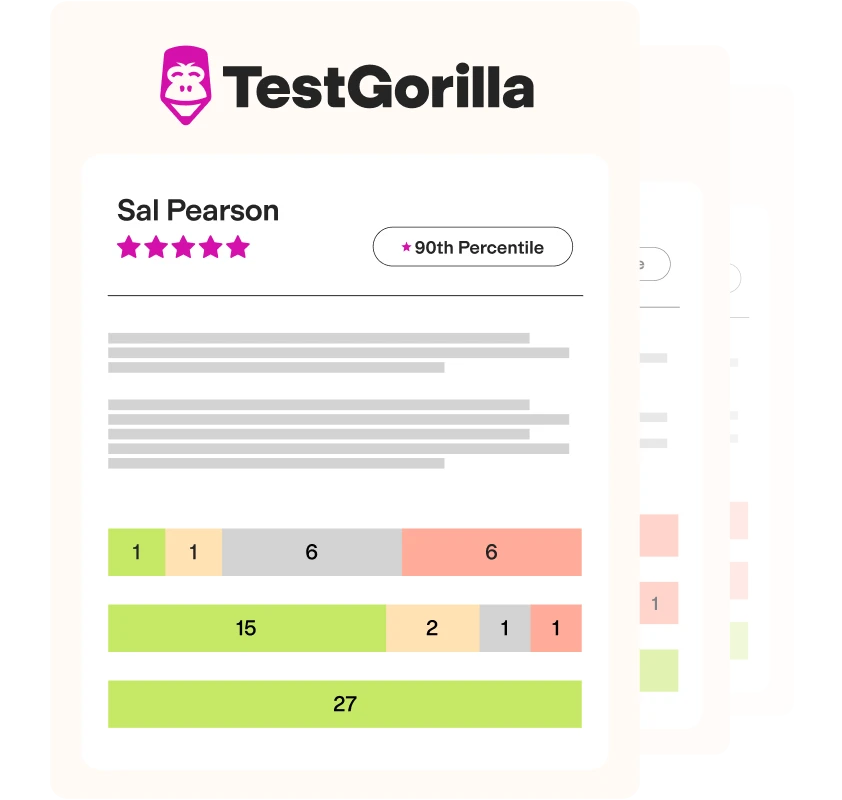Spanish C1 (Advanced) test
Summary of the Spanish C1 (Advanced) test
The Spanish C1 (Advanced) test evaluates a candidate’s knowledge of the Spanish language at the C1 level of the CEFR framework. This test will help you hire employees who can participate in demanding professional and social conversations in Spanish.
Covered skills
Grammar
Vocabulary and spelling
Reading comprehension
Listening comprehension
Use the Spanish C1 (Advanced) test to hire
Editors, writers, content creators, customer success managers, and other employees who need advanced Spanish skills to perform well in their roles.
About the Spanish C1 (Advanced) test
Employees who possess advanced skills in Spanish will enrich your company’s internal and external communications by clearly and effectively discussing ideas, plans, and goals with customers and colleagues. They will also be able to write well-structured reports, presentations, and other material in Spanish to help promote the company’s brand and ideas to others. The Spanish C1 (Advanced) test evaluates a candidate’s ability to communicate at the C1 level of the Common European Framework of Reference (CEFR) for Languages. The test evaluates candidates in the areas of grammar and vocabulary, sentence composition, reading comprehension, and listening comprehension. Employees with advanced Spanish skills can express themselves fluently and spontaneously without much searching for expressions. They can understand demanding, longer texts and recognize implicit meaning in both written and verbal communications.
They use the language flexibly and effectively for social, academic, and professional purposes and can produce detailed texts on complex subjects, showing a controlled use of organizational patterns, connectors, and cohesive devices.
The test is made by a subject-matter expert
TestGorilla’s tests are created by subject matter experts. We assess potential subject-matter experts based on their knowledge, ability, and reputation.Before being published, each test is peer-reviewed by another expert, then calibrated using hundreds of test takers with relevant experience in the subject.
Our feedback mechanisms and unique algorithms allow our subject-matter experts to constantly improve their tests.
Geovanna F.
Having grown up speaking both Spanish and English, Geovanna has had a life-long affinity for languages. Armed with a bachelor’s degree in English and a TESOL certificate, Geovanna has been working as a translator and interpreter for over five years. Her work includes a variety of media such as articles, flyers, websites, manuals, lesson plans, educational content, and much more.
When not busy in her role as a Spanish translator, Geovanna teaches English to Chinese students online.
Reliability: Cronbach’s alpha coefficient = .87
Face validity: Candidates rated this test as accurately measuring their skills (average score of 3.98 out of 5.00).
Criterion-related validity: Candidates with higher scores on this test received higher average ratings from the hiring team during the selection process (r = .37, N = 73).
For an in-depth look at interpreting test results, please take a look at our Science series articles: How to interpret test fact sheets (part 1): Reliability, and How to interpret test fact sheets (part 2): Validity.
For an explanation of the various terms, please refer to our Science glossary.
Reliability and validity | Sufficient data available | Analyses and checks conducted | Outcome |
|---|---|---|---|
Reliability | ✔ | ✔ | Acceptable |
Content validity | ✔ | ✔ | Acceptable |
Face validity | ✔ | ✔ | Acceptable |
Construct validity | Pending | Pending | Pending |
Criterion-related validity | ✔ | ✔ | Acceptable |
Group differences | |||
Age differences | Pending | Pending | Pending |
Gender differences | ✔ | ✔ | Acceptable |
Ethnicity differences | Pending | Pending | Pending |
Use TestGorilla to hire the best faster, easier and bias-free
Our screening tests identify the best candidates and make your hiring decisions faster, easier, and bias-free.
Create high-quality assessments, fast
Building assessments is a breeze with TestGorilla. Get started with these simple steps.
How can you measure language proficiency with a C1 Spanish test?
The C1 Spanish test will help you evaluate how well your candidates read, listen, speak, and write in Spanish. The C1 in the test’s name represents the level of operational proficiency a person has in the Spanish language, according to the CEFR framework. We’ll look at this in more detail later.
The test assesses how well your candidates can discuss ideas, plans, and goals with potential customers, stakeholders, and investors. It also evaluates whether the applicants can write a well-structured report, presentation, or memo in the Spanish language that can promote your organization’s brand to others.
C1 is one of the highest proficiency levels in the CEFR framework, and a company that is seeking candidates with this level of Spanish-language proficiency is usually trying to fill one of the following roles:
• Copyeditors
• Content writers
• Content creators
• Customer-success managers
• Business-development managers
When you need applicants to be fluent in Spanish, you should give them a C1 Spanish test to evaluate their language proficiency. With a pre-employment test, you can assess their skills objectively and without bias.
What does the C1 Spanish test measure?
The Spanish C1 test measures candidates’ knowledge, skills, and abilities in four main areas:
• Reading comprehension: Reading comprehension has to do with how well your candidates can interpret the Spanish language when it’s presented to them in a written form. Since you’re looking for a C1 Spanish-language speaker, your candidates shouldn’t have any problems in this area, even when reading complex and technical text.
• Writing proficiency: Writing proficiency is how coherently candidates can express their ideas and thoughts in writing. A candidate with a C1 proficiency level shouldn’t have problems expressing their views in a nuanced way, including when they are writing about complex topics.
• Vocabulary: Vocabulary has to do with your candidates’ ability to communicate verbally with other Spanish-speaking people. A candidate with a C1 level of proficiency shouldn’t need to grasp to find certain phrases or words. They should be able to have a natural and flowing conversation, even when they are discussing complicated subjects.
• Listening comprehension: Listening is one of the most difficult areas of language to master. When candidates listen to someone speaking Spanish, they need to understand the language’s complexities, nuances, and idioms, and then be able to respond so that the conversation continues. A candidate with C1 proficiency should be able to understand all of the language’s complexities and respond with ease.
What is the CEFR framework?
CEFR stands for the Common European Framework of Reference for Languages. CEFR recognizes six language-proficiency levels. So when you want to hire a candidate who has a C1 proficiency level in Spanish, you should test them with a C1 Spanish test.
The CEFR’s six proficiency levels are:
• A1 (Beginner): At this level, the candidate only knows simple words, phrases, verbs, and adverbs.
• A2 (Elementary): A candidate at this level has a deeper understanding than someone at the beginner level, and they can introduce themselves in Spanish. On top of that, they can speak about geography, family, community, and work.
• B1 (Lower intermediate): If a candidate is at this level, they understand around 60% of the language. Even though they still make errors, they can have a conversation with a native Spanish speaker.
• B2 (Upper-intermediate): When a candidate is at this level, they can discuss many different topics with a native Spanish speaker almost effortlessly.
• C1 (Operational proficiency): A candidate at this level has achieved operational proficiency. This means that they can understand the language’s subtleties, like idioms and complex text. Additionally, they can converse about complex topics with ease.
• C2 (Mastery): At this level, the candidate’s proficiency can be considered equivalent to that of a native Spanish speaker. They can hold even the most challenging conversations with native speakers on any topic.
A more complex test, like the C2 Spanish test, might filter out suitable candidates for no reason. On the other hand, a simpler test for the A or B levels might not be challenging enough to provide useful information about the candidate’s proficiency. So if you want an advanced language speaker, give them a C1 Spanish test.
How can the C1 Spanish test help you hire the right candidate?
When you use a pre-employment assessment tool like our C1 Spanish test, you increase your chances of finding a candidate with advanced proficiency in Spanish. Here are four key benefits of using our pre-employment tests:
• They’re bias-free: When you use a pre-employment test, you assess all the candidates who apply for your open role. This removes bias from the hiring process, since every applicant takes the same pre-employment test and is evaluated on their results. When you start the recruitment process by screening CVs, some less-than-ideal candidates can make it to the next stage and some great candidates can be filtered out.
• They’re objective: With TestGorilla’s pre-employment assessments, all of the candidates receive the same test. You also get numerical results for each applicant, so you can easily compare candidates to see who did better on the test.
• They’re scalable: Pre-employment testing is a scalable solution to the hiring process. No matter how many applicants you have, you can distribute the test to all your candidates with a single click and simply wait for the results.
• They’re made by experts: All of TestGorilla’s tests are created by subject-matter experts. Then they’re assessed by another subject-matter expert with relevant knowledge in the field. After that, the test goes through multiple feedback rounds until it is the best possible version of the test, and only then is it uploaded to our test library.
In summary
If you need to hire a Spanish-speaking candidate with a C1 proficiency level, don’t leave finding the right candidate to chance. Use a C1 Spanish test to avoid bias and receive objective scores for your applicants, helping you to find the most skilled candidates for the job.
FAQs
View a sample report
The Spanish C1 (Advanced) test will be included in a PDF report along with the other tests from your assessment. You can easily download and share this report with colleagues and candidates.







